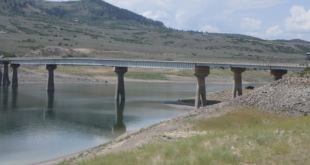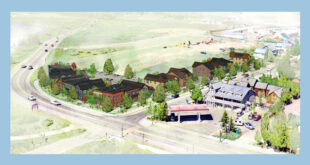If a human poops in the woods, does it flow downhill? Yes.
By Toni Todd
(This is the second in a series addressing building issues at Irwin)
Since Irwin’s mining heyday, the number of rugged individuals who’ve ventured to call the place home have been few. But today, those numbers are growing. Folks are searching for affordable lots, to get away from the hordes, to find a special place, or forge their own, off-the-grid lives, on their own land in the mountains. Add that trend to a growing population downstream, and you can see the potential for a toxic brew polluting Crested Butte’s water supply.
Last week, county and Crested Butte town officials met with Irwin property owners at Town Hall in Crested Butte to discuss and clarify what’s allowed, what’s not, and what’s required to build, live, or camp on private property in Irwin.
They provided several answers—and in some cases, solutions—for those faced with limited options on the property they’ve purchased. Those solutions will not likely be easy or cheap, but in many cases, working with the county and the town, there’s a way to comply with strict wastewater treatment regulations and live in paradise.
Crested Butte public works director Rodney Due explained why wastewater is such a concern in the Irwin area. “If your property drains toward Lake Irwin, you’re part of the Crested Butte Watershed Protection District [CBWPD],” Due said. All of that water makes its way to Coal Creek, Crested Butte’s source of drinking water. “The district is there to ensure that nothing’s being done to pollute the water supply.” Due explained that protecting the town’s water is paramount. “If there’s ever a conflict between the county and the CBWPD, the most stringent [rule] applies,” he said.
Due described rules for setbacks, land restoration projects, any land disturbances that involve digging or grading, repair and maintenance on the property, wastewater improvement projects, etc. He shared which types of projects are exempt, which types aren’t, which deal exclusively with the county, and which also require a permit from the Watershed Protection District. His overarching message: With any project, give him a call.
“If anybody has any questions about whether you’re in the watershed, Rodney will be happy to drive up,” said Crystal Lambert, building and environmental health official for Gunnison County.
“By and large, people who live in Irwin are environmentalists,” said Irwin resident John Biro. He agreed that strict regulations are in order, but suggested enforcement of the rules on residents won’t protect the watershed if campers are allowed to swarm the place, leaving a swath of environmental destruction in their wake.
“On the Fourth of July,” Biro said, “there were probably 200 people swimming in your drinking water. There are snowmobiles spewing two-stroke oil into the lake. There are septic trucks filled with crap on those roads.”
“The campground is on federal land,” said Gunnison County community development director Cathie Pagano, and the county has no control over that. To Biro and other Irwinites, that seemed beside the point, especially if the end goal is to keep the water clean. Biro suggested that if officials really want to protect the water supply, use of federal lands and the lake must also be addressed. “It’s a massive amount of people you guys say you don’t have control over.”
“Those concerns I think are very valid,” said Due.
Pagano said the county commissioners are looking to address that. They’re developing a sustainable tourism committee, to include representatives from federal agencies, hoping to find solutions to those problems. “Yes,” she agreed, “there are areas in our county where there are impacts from too many visitors.”
Lambert shared the riveting history of septic regulations in Colorado. In 1995, she explained, Gunnison County adopted the state’s rules for individual sewage disposal. In 1996, she added, a special area was created in the Lake Irwin area: the CBWPD. The district originally allowed gray-water systems, no-flush systems, incinerating and composting. It was all supposed to fall under a rigorous, annual inspection system that required people to test their water. “But it was really not enforced,” Lambert said. “And honestly, they were over the top. Thankfully, many people in Irwin tested their water anyway.
“Enter the state of Colorado,” Lambert continued. “Today, everybody has to abide by their rules for treatment. Now, the state mandates full septic systems. But we still recognize that the Crested Butte Watershed is a special district. Now all systems must be high-level treatment systems.”
Lambert explained that complying with state and watershed regulations has gotten easier and less costly.
“If the NAWT [National Association of Wastewater Technicians] says a system is working and they see no need for annual inspection, you can qualify for self-inspection,” said Lambert. “You just send the results to us. So, it’s a little bit simpler.”
Lambert described the rules for setbacks from waterways and wetlands, and why those are strict. “That’s been the requirement since 1995,” she said. “You’re not the only special protection district in the county. There’s also Marble.”
Real estate agent Mindy Sturm said she attended the meeting so she’d know how to guide prospective buyers in Irwin. She wanted information specifically about setbacks from neighboring wells. Are there circumstances, she asked, where a lot is too small or positioned in such a way the setback rules would prohibit building or putting in a septic system?
“There are areas where there are significant constraints,” said Pagano. “Yes. There are areas where you might not meet the setback regulations.”
“Occasions for variances must be approved by the [state] Environmental Health board,” added Lambert.
“But [variance distances] are never less than the state standard,” clarified Pagano.
So-called grandfathered systems, those installed many years ago for older homes, are also not always safe. “Anything related to public health and safety is not grandfathered,” said Pagano.
“If someone purchases a lot and they want it contingent upon whether it’s buildable, will you come out?” asked Sturm.
“We don’t inspect properties,” said Pagano.
“But you can work with local septic installers and they are awesome,” added Lambert.
One audience member suggested the county should look at new technologies and approve those waste disposal systems if they meet a high enough standard.
Pagano explained that the county was, in large measure, constrained from doing so by the state. “If you think we can approve systems the state doesn’t approve, we can’t,” she said.
There was also some need at the meeting to clarify the definition of an accessory dwelling.
“It’s a structure added to a property that already has a residence,” said Lambert. She made clear that accessory structures are not dwellings and you can’t live in them. Accessory structures up to 200 square feet can be constructed without a building permit.
“There is no minimum size anymore for a home,” added Pagano, “but we do require a permit for all homes. Tiny homes always require a permit.”
Tiny homes (on wheels) must meet the state standard for an RV, complete with certification. “We don’t want you to spend $20,000 for a tiny home and then not be able to use it,” Pagano cautioned. “So, call us.”
Access has been a concern and has impacted buildability of some lots.
“If it’s a road we can put in that serves a number of homes, we can work with property owners,” said assistant county manager Marlene Crosby.
“It’s not an easy place to build,” said Pagano. Some areas are too steep for a road, she said, and some access requires cutting across wetlands, which requires approval from the U.S. Army Corp of Engineers. “Original plats were drawn out on paper in the 1800s in New York City and we find [today] that doesn’t really work on the ground.”
“Say you don’t have an RV,” said Irwin resident Kristi Murrin. “Can you pitch a tent and camp on your private lot?”
“If you’re camping more than 14 days in any three-month period, you need a long-term permit,” said Pagano. “With that, we also want to know how you’re dealing with wastewater.”
“It’s more than poo and pee,” added Lambert. “It’s all wastewater.” That includes water from bathing, dishes, and more.
Pagano said the county prefers to treat each camping request individually. Camping supported by a residence on the property, for example, might be approved if campers have access to the home.
The primary message officials wanted Irwin residents to take away from the meeting was for them to please call or stop in to chat about any ideas, plans or notions they have before taking action on private property, and to check in with Rodney Due if they have any concerns about the rules and requirements within the Crested Butte Watershed Protection District.
 The Crested Butte News Serving the Gunnison Valley since 1999
The Crested Butte News Serving the Gunnison Valley since 1999




